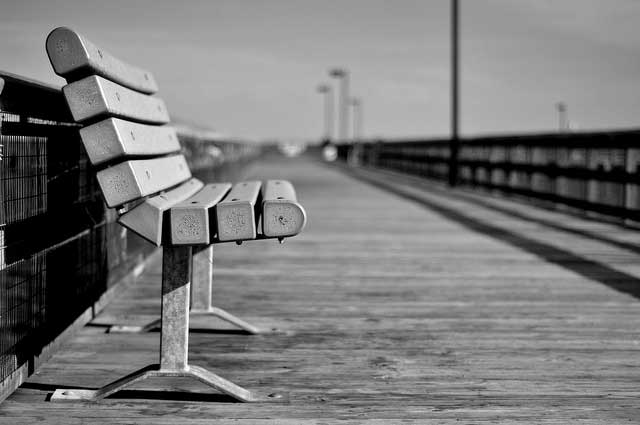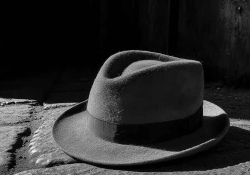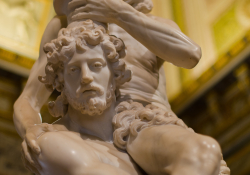Visting the Master

What are masters for? Isn’t the relationship between master and disciple one of those relationships whose very existence depends on it never being named?
Over the bay stood a rock that rose windmill-like toward the sky and then appeared to fall onto the town; there, where the rock ended and the sky began, lay a monastery in ruins. From the moment she rested her pencil on her notebook, she knew that the only way for her to get a good view of it all would be by facing the town from a point located somewhere out in the ocean, but since she only sketched what she could see and not what she imagined she’d see if she were somewhere else, she put the pencil and notebook back in her pocket. A car drove up and stopped near her and a couple got out. They were both fat; the woman was walking with the help of a cane, and they were arguing dispassionately, as only people whose life together is one long, ongoing argument can. They sat down on the bench by the bus stop and she looked away, noticing that the bus that had dropped her off minutes before was still idling there. She looked up again at the town and the surrounding bay, trying to force herself to somehow combine the two at an angle that would allow her to make the sketch, but she couldn’t. Instead, when she glanced over at the newsstand beside the bus stop, she noticed that its racks only contained out-of-date magazines and cassette tapes by musicians already dead or forgotten, which were themselves products of an outmoded technology. She told herself were she to move closer and read the newspapers—laid out face-down so that people waiting for the bus had to buy them if they wanted to read the headlines—the only news she would read would be obsolete, as if reaching the town were a matter of traversing not the distance between the town and the city she had left from that morning but rather an unspeakable amount of time.
She told herself were she to move closer and read the newspapers, the only news she would read would be obsolete, as if reaching the town were a matter of traversing not the distance between the town and the city she had left from that morning but rather an unspeakable amount of time.
Once, the man she was here to visit—the man she secretly considered a master—had written an article about another writer in which he argued that the true mark of genius lies in being a few minutes ahead of one’s time; but only a few minutes and no more, he said, because any greater temporal distance—a year, for example—would lead to incomprehension, a considerable delay, and getting called “backward,” which, for whatever reason, results in little glory. A few days after reading his column in the paper and commenting on it in a letter to him, she received in reply a long rant where, relieved of any and all concern writers have for readers of the Sunday supplement, the master said he actually thought that being ahead of one’s time must be hell on Earth. Staring at the cassette tapes and magazines on the newsstand’s racks, she thought she understood that, while he disdained the future, the master lived in a place situated behind the times, a place where things swam against the current in an attempt to reach a present always located further afield—as exemplified by the town’s bus station—but only fully expressed a few hours later when she returned to the big city, the one she had departed from that morning, almost without noticing, absorbed as she was in one of the master’s books, not knowing, as the train progressed through dozens of tourist towns consisting of little more than a few tall, nondescript buildings situated along one side of the tracks and an immaculate stretch of sand along the other, that she was actually heading toward the past.
She pulled herself away from the newspaper kiosk and crossed the street to sit on a bench along the boardwalk. Facing the boardwalk was a rock that had been joined to the shore by a narrow cement bridge, dividing the bay into two parts united and separated by the very rock they touched, above which flew the country’s flag. A few weary-looking tourists took pictures in front of it; when they finished, they turned around and headed toward the seawall and, although from far away they looked old to her, as they came closer she could see that they were young, about her age, she thought, even though they already looked like survivors of some terrible disaster, an earthquake or a conventional marriage, perhaps, with the typical jobs and car payments, in the middle of a journey from the despotic parents who preceded and shaped them to the despotic children who would survive them. Perhaps they’d purchased this package tour a few months ago and could no longer remember why, exactly, when they had seen pictures of the rock crowning the bay in the brochure, they decided to go there at some point and take a picture at its summit. No kind of love can survive the planning of vacations, she thought, and she remembered a story by the master in which a couple goes on vacation to a seaside town to save their marriage or catch a shark, “whatever happens first.” She couldn’t really remember what happened next, although she felt the story was rendered brutally realistic by the fact that both possibilities seemed entirely out of place.
She picked up her pencil and did a quick sketch of the bay, noticing that it resembled the breasts of a marine goddess, a goddess offering them to the town as constant comfort and nourishment for the hungry and afflicted, who were, no doubt, a number of them there. Above the sketch, in her notebook—plain and no bigger than the palm of her hand, since that’s how she liked them best—was the phone number of the master, scribbled there by the writer himself when they had met in a small German city on a night riddled with inconveniences.
That evening, the master had gone to present a book of his that had been translated into German and found himself trapped in a ridiculous situation: the person responsible for translating the question-and-answer session was so nervous that he said everything backward. The master would say, for example: “I wrote this book with no concern for the way literature was written in my country,” and the translator would affirm: “He wrote this book concerned with the way literature was written in his country.” This went on for the whole evening. None of the attendees—many of whom had no difficulty understanding Spanish—said anything; but she raised her hand and explained that he wasn’t being translated properly, and this endeared her to him. As a result, at the dinner afterward, they talked about the literary tradition of her country, which he knew so thoroughly it could have been his own, about life in Germany, about books of his that she’d read and those she hadn’t yet read but would read later, about her irrational fear of Mexican food. Later that same night he took her notebook and jotted down his phone number, saying, “Give me a ring if you’re ever in town.” And then he left.
From that point on they exchanged dozens of letters and even managed to see each other a handful of times more, but never in the town where he lived, which he sometimes told her resembled the place in Chile where he was born, and on other occasions swore that it was like the landscape of his dreams—utterly sure that this landscape, which could only exist in hell, was the one he would see when he opened his eyes after dying; interestingly, he’d say, this landscape bore a strong resemblance to his birthplace in Chile, which puzzled and frightened her when she considered that hell might be region X in Chile. A significant part of his letters were dedicated to describing this hellish region he said he came from and which, he was convinced, he would find himself waking up in on the day he died; the other part, no less considerable, was dedicated to literary gossip, as though he were inclined, after describing the geography of hell, to explain its ethnology. Naturally, he also gave her advice: don’t drink, don’t take yourself too seriously, and don’t forget that one true sentence is worth more than any editor’s approval. It was good advice, and she kept it in mind, but her life was too difficult, she thought, and sometimes the gossip wasn’t enough to lift her spirits.
She thought back to the time when they both wound up at the same reading by a prominent author, an author who’d won everything and been everything: first a communist and then a capitalist and then, finally, a nothing, just a gob of spit, an entry in the Spanish-language literature pages and a contributor to his country’s tourist trade since his books made thousands of people curious to see with their own eyes this much-written-about place, where people were so poor and so happy; these readers were rather simple people who thought the inhabitants of this place were happy because they lacked the complications of modern life his readers dealt with, such as electricity, plumbing, and food. It was no coincidence that the majority of his readers were German, since for some reason Germans believe that anyone who lives in a country without hospitals must be happy. At the reading, both her and her master’s attention lagged until something unexpected happened: a tall, blonde, elegant, and stunningly beautiful woman walked into the room and someone whispered: “That’s her. The other woman.” The whispers multiplied, spreading through the room with only superficial variations, but the woman kept walking, dragging the enormous weight of this stone behind her. She wondered why the woman had come to an event like this, when she knew everyone would be staring at her with pity and disgust and a tiny bit of compassion, but then something else unexpected occurred: a woman stood up and approached the other woman. She was shorter than the other woman and had to stand on the balls of her feet to pretend to kiss her cheeks, first one and then the other. From where she and the master were sitting they couldn’t see the shorter woman’s face, but they were able to watch the mistress’s face take on an expression of tremendous disgust when the woman greeted her; they were also able to notice that afterward, when the two women exchanged the obligatory pleasantries, the other woman let her gaze wander around the room, as though her lover’s wife were utterly invisible. He and she were subsequently in total agreement, united in their opinion in a way that thrilled them, with the happiness of children who wish to shout it to the four winds: from that point on their favorite was—and always would be—the other woman.
She asked herself why she’d never written about this, since she had fervently promised him she would. A boat neared the bay appearing to leave a trail of smoke in its wake the way steamships once did. When she got closer, however, she realized it wasn’t smoke trailing the boat but rather a flock of seagulls that kept swooping down toward the deck over and over again, following the boat like bad luck. She began to sketch this trail and didn’t notice when someone sat down beside her. When she looked up, she was staring into the face of a teenage boy a few years younger than she; he looked back at her with curiosity. “What are you drawing?” he asked. “Nothing special,” she said, adding, “I’m always drawing something,” and then stood up; the boat had almost reached the port. “Mind if I join you?” he asked. “Shouldn’t you be in school?” she said, without looking away. “I’m never setting foot in that place again,” he said, his face solemn.
She reminded him of someone. As they walked toward the port, she realized that he reminded her of the master, and again she asked herself why she had come: was it simply to round out the personal compendium of writers she had known and admired, writers whom she had consulted in search of a solution to a sentence or for general advice, and who had also given her devastating critiques and words of encouragement, as well as more practical things, like instructions for how to make a printer work, the recommendation of a certain CD, or the suggestion to eat lots of vegetables; that is, company in hours of doubt and desperation. In any case, wasn’t that precisely what masters were for? she would tell herself, often adding, Isn’t the relationship between master and disciple one of those relationships whose very existence depends on it never being named? If she could, she thought, she would have told the people she had capriciously chosen as masters of their role, but this would have broken the bond for good. In any case, this was just another of the difficulties of literary life.
They were sitting on the seawall overlooking the bay when the boy asked her, “What are you thinking about?” She didn’t reply. “You’re not from around here, are you?” he said. “I’m German,” she replied. “My father has quite a few friends in Germany,” the boy said, “but he always says the food there’s awful.” She smiled at him. “My father’s a writer,” he said, “maybe you’ve read his work. Are you at all interested in books?” “Kind of,” she said. Then he said who his father was, and she looked out over the bay for a second and held her breath and then said no, she’d never read his work.
For a long time they sat there quietly, watching the boat dock at the pier. It was the same boat she had seen heading toward the bay earlier, but the seagulls had already abandoned it; their activity had been replaced by half a dozen deckhands dumping fish by the bucketful onto the deck and then distributing them in boxes; when the boxes were full, they sealed them up and stacked them in a corner. Sometimes, a fish that was still struggling to survive would leap out onto the deck, but one of the deckhands would immediately put it back in its box. This would happen once or twice until finally the fish seemed to give up or die, although its gills would still open and close intermittently a while longer.
The deckhands went about their work swiftly and reflexively: in their hands, the shapeless, silvery mass became all sorts of fish—though to her they all looked alike—landing in various boxes, while the starfish and sea urchins, of no use to the deckhands, were tossed overboard. She wondered if the creatures the fishermen had rejected could still survive, if the damage they had suffered in captivity wasn’t irreversible, but she didn’t dare ask. The octopuses, though few in number, had their own box, which they climbed out of in order to try and drag themselves across the deck to freedom, but, each time one of them had almost reached the edge, a deckhand grabbed it and put it back in the box. They’d latch onto the deck with their tentacles, the deckhands then giving them a forceful tug—in most cases without even giving it a second thought—and, after a brief struggle, the octopuses would come unstuck with a sucking sound. However, no sooner had they landed back in the box they would climb out again, attempting to reach the edge of the ship with a tenacity she found painful; it reminded her of the determination of stray dogs that go crazy and die still looking for the homes of the people who abandoned them. Then she seemed to recall something completely unrelated: an afternoon she had spent with a man walking around a German cemetery.
They had arrived there almost by accident, after following a narrow road along the outskirts of the city where they both lived. Along the way they came upon some train tracks being guarded by a group of police officers talking on their phones. He explained to her that a train carrying nuclear waste from a French reactor to a nearby dumping site was due to pass through that same day, and an environmentalist group was planning to block its passage in protest. She asked him whether they objected to the train because it contained radioactive material, or because it was French, and thought to herself that if a train carrying radioactive material were to pass near her she would do nothing to stop it; on the contrary, she would feel relieved to watch it disappear over the horizon. Then they arrived at the cemetery, which was covered in the dry leaves of that time of year. They walked among the tombs, commenting briefly on the names on the headstones, both of them made uneasy by the fact that most of the earliest recorded deaths had happened at about their age, as though they were somehow partly to blame. Then they crossed a field dotted with crosses honoring those who had died in the two world wars, crosses that were all identical, and she thought that it must comfort the families to know there had been so many others in the same situation; even if they had been richer or better looking or more fortunate, in the end they simply got what everyone received, a small mound of earth and the repudiation of their countrymen for having lost. Then they came upon a lake and it was there that he took her hand. He took her hand and nothing more, he didn’t dare try anything else, or perhaps this physical closeness was simply enough for him. She felt like kissing him, but didn’t. Then he took her back to her apartment and said goodbye at the door. It was one of the best afternoons she had spent in this country and this city, but the following day she read in the newspaper that an activist who’d chained himself to the tracks to protest the radioactive materials’ transport died on the way to the hospital after the train, which couldn’t be stopped in time, severed his legs, and she realized that, in a way, what had happened to the activist was the exact opposite of what had happened to her in the cemetery, and she thought that there was a finite amount of happiness in the world that passed from one person to the next, and then thought her unhappy moments were someone else’s happy moments, and she slowly but compassionately began to hate this other person, whom she would never meet.
Then she remembered the master and the octopuses incapable of saving themselves, and the thought of them made her start to cry. “Why are you crying?” he asked. “I would save every last one if I could,” she managed to say.
She stood up, as did the boy, and they both started walking back to the bus stop. “Did you come here to visit someone?” he asked her. “Yeah, but they don’t live here anymore,” she said. Then she remembered the master and the octopuses incapable of saving themselves, and the thought of them made her start to cry. “Why are you crying?” he asked. “I would save every last one if I could,” she managed to say. “Weird,” he said, a few seconds later, “my dad once said something like that.” Then the boy looked out at the ocean and the beach, where the town and the rock it stood upon were beginning to cast their shadows, and said, “Once, before we moved here, my dad was driving me to school. It was really early in the morning and some literary program or whatever was on the radio, and they had Jaime Gil de Biedma on. I think he was pretty old by then, so everything held for him the significance of someone who’s on their way out, as well as the irrelevance of someone who understands that the world already belongs to other people. The interviewer asked him to read a few of his poems, and so he did—in a voice that was both booming and extremely delicate, a voice that seemed to show that poetry is, in its fragility, harder and more enduring than a rock—and then my father stopped the car and brought his hands to his face, and I said: ‘Why’d you stop the car?’ and he said, ‘Because I couldn’t see through my tears,’ and then he cried a while longer before saying, ‘If I could, I would save every last one of them,’ and then I realized that he wasn’t crying for Gil de Biedma or for poetry, he was crying for himself, for what he had wanted to be and what he was and for all the writers consumed by alcohol or despair, and for those who could’ve been great, even, but were merely mediocre or nobodies, and for all the writers who couldn’t avoid being like him.”
She looked up at the boy from behind her tears, but he was staring at the beach and didn’t even seem to notice when the bus arrived. She got on, but right before the doors closed she said, “Tell your dad I said ‘hi.’ Tell him he’s one of the brave ones.” Then the doors closed and the bus started moving. She looked back at him standing there at the bus stop and saw his lips moving and the sea in the distance and the rock dividing the bay and the national flag, and then all of it disappeared from view.
Translation from the Spanish
By Kathleen Heil
Editorial note: From El mundo sin las personas que lo afean y lo arruinan by Patricio Pron (Barcelona: Random House Mondadori, 2010)









